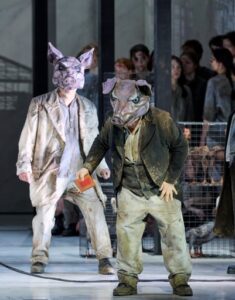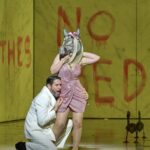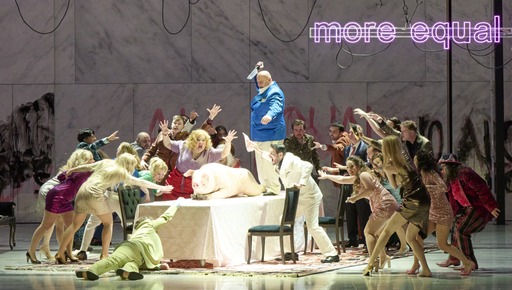She, in a tight, red satin skirt, gold curly hair reminiscent of Miss Piggy; he, crawling, on his knees, in a fluorescent green suit. ‘Just the last one’, he pleads; she, ‘get off, you old goat.’ Lewd, gross, they act like ‘animals’, but they’re the farmers, Mr. and Mrs. Jones, (Daniel Jenz, Aurora Marthens). The animals have their own dignity. But based on Orwell’s 1945 political allegory, pre-dating modern ‘Animal Rights’, the characters are anthropomorphic to masque Orwell’s revolutionary agenda. Raskatov’s music, echoing Shostakovich, is theatrical, mixing genres; vocal extremes serve plot, depict characters, argues Vienna State Opera’s producer Damiano Michieletto .

‘Comrades! I do not think I shall be with you much longer,’ declares Old Major, a Marxian figure, who preaches his dream of a classless society. Major (Gennady Bezzubenkov), as all the principal animals, wears a prosthetic mask; his is a pig’s head. He stands in front of cages – suspended on industrial hooks- horrific, piled up, the animals in black despair. “We are given just as much food to keep us alive. Then slaughtered with hideous cruelty.” He sings of his dream: what’s this life? Raskatov’s music (text Ian Burton) screams at you. This life is short and miserable. There are horrid squeals from the cages. Major kneels, and keels over.
‘Is that not simply the order of nature’, interjects Benjamin, the wise donkey, who represents common sense, against Marxist political ideology. ‘No! Because the product of our labour is stolen from us. (More high-pitched grunting sounds.) ‘Man is the only enemy.’ – ‘Yet man is the king of the animals.’ – Major, sings in an extraordinarily low bass, ‘Not one of us’. – ‘Comrades, cows, pigs, no animal owns more than his own skin. My message to you comrades’- he holds up his red book- ‘all animals are equal; all men enemies.’ They all stand front of stage, facing us, holding up their masks. (And we see a tray of bloody red meat.)
‘Will there be sugar after the revolution? Shall I be allowed to wear ribbons’, asks Mollie (Holly Flack), a freethinking, material woman, who goes her own way. Clad all-in-black- wearing sunglasses- Elena Vassilieva’s Blacky declares, ‘you can’t believe anything you can’t see, but Sugar Candy Mountain.’- But ‘there’s nothing at all beyond the clouds’, responds Clover the mare (mezzo Margaret Plummer). It’s announced, Jones got so drunk, the animals are still not fed, sing the Chorus in a mixture of high-pitched squealing.
The Tyrant is overthrown: comrades, our revolution has succeeded. Trumping to a beat, they sing like a spiritualist choir. Comrades, sings Snowball (Michael Gniffke) – cropped hair, trimmed beard- a lyrical, high tenor. He and ‘Napoleon’ have proclaimed the Seven Commandments, (written on the wall), that guarantee animal equality. (We see Pilkington pull Mollie, and copulate with her.) You know my motto, I will work harder, vows Boxer, a workhorse, who stands for working class loyalty. The graffiti on the wall asks the animals to ‘sign up for our committees.’ (For the ducks, Re-education, for the cows, Pure milk united! But where does the milk go? – For the pigs! The slogan is “FOUR LEGS GOOD, TWO LEGS BAD!”
The farmers supported by neighbour Pilkington attempt to put down the rebellion. Come on lads, the slaughterers call, let’s finish them off! Their white overalls are splattered with blood. (The animals report six losses.) Snowball thanks them for their bravery. Boxer is honoured as ‘Animal Hero Class 1’; also adopted by Napoleon. But they fall out, as revolutionaries do.
Meanwhile, others are practicing free love. Mollie, Flack with her stunning coloratura, is preening herself,(and told-off by Boxer.) She’s seduced by the white-suited Pilkington ( Clemens Unterreiner) who offers her jewels. (This crazy guy will offer me jewels, and sugar every night!) He stands behind her, mimicking the motions of copulation. At last, she removes her mask, the very beautiful Holly Flack.
She’s seduced by the white-suited Pilkington ( Clemens Unterreiner) who offers her jewels. (This crazy guy will offer me jewels, and sugar every night!) He stands behind her, mimicking the motions of copulation. At last, she removes her mask, the very beautiful Holly Flack.
Eerie sounds on xylophone. The ‘Revolutionary Committee’ investigate. – ‘I fear she was enjoying herself! (Why should they care.) Molly was seen ‘associating’ – allowing him to stroke her nose!
They fall out over a windmill – Snowball’s pet scheme to power a dynamo to light the stalls. Whereas Napoleon wants to train them to defend themselves. ‘Any questions will be decided by myself,’ he asserts. ‘No more debates!’ They whine, the animals repeating the slogan, ‘four legs good, two legs bad.’- Iron discipline, proclaims Napoleon; one false step and our enemies…They wave flags. Chorus sing the revolutionary anthem, “Someday the tyrant will be overthrown”. But Napoleon (sings) he’ll never negotiate with and fraternize with the enemy.
Snowball, demonised as a traitor, is hunted down. Rumours of counter-revolution, secret agents. (Like Trotsky, outlawed by Stalin.) Why Napoleon needed him dead? Gniffke’s Snowball – the fugitive, his clothes dusty, worn-out- is confronted by Bankl’s Napoleon wearing a splendid royal blue satin jacket, (reminiscent of David’s Napoleon portraits). But facially, Bankl looks uncannily like Khruschev. Snowball/Gniffke is led behind a screen, pleading. Goats call, have mercy. But Squealer, (Andrei Popov) like a Communist propagandist, party official, makes them confess to smashing Napoleon’s bust. A chorus of cows wail. All the animal groups confess. Was it for this they worked and fasted, they sing.
 Act 2 (of 9 Scenes), curtain up on a high-tech chair. An animal carcase, a pig, is hanging down- (Oh, god of pigs, please save me!) – in front of the neon sign, ALL ANIMALS ARE EQUAL. The blue-blazered dictator, Bankl sings softly, “They’ll find me in the night. They’ll smell me.” (Stalin, the dictator’s historical fear for his life.) Chorus sing, Snowball has attached himself to Pilkington. (Jones’ secret agent all the time!) ‘Secret agent’ echoes, picked up and circulated by the crowd.
Act 2 (of 9 Scenes), curtain up on a high-tech chair. An animal carcase, a pig, is hanging down- (Oh, god of pigs, please save me!) – in front of the neon sign, ALL ANIMALS ARE EQUAL. The blue-blazered dictator, Bankl sings softly, “They’ll find me in the night. They’ll smell me.” (Stalin, the dictator’s historical fear for his life.) Chorus sing, Snowball has attached himself to Pilkington. (Jones’ secret agent all the time!) ‘Secret agent’ echoes, picked up and circulated by the crowd.
The artist Pigetta (Karl Laquit) swishes in, wearing a plush red velvet gown. The black-suited, white-shirted secret service boss Squealer (Popov) croons, facing her opposite stage, ‘Oh, let me out- You are a beauty!’ But (the bouquet he offered), they’re not flowers, but a wreath.
WORKING, EATING, SLEEPING, GOOD THINKING, sing Chorus, like a Communist catechism .
Blacky, (all-in-black) raises up Benjamin, (Karl Laquit), but now as the soothsayer with his walking sticks. We see Napoleon, Bankl in royal blue, standing by a printing press disseminating copies of ‘TRUTH’, (Pravda Communist Party Paper). A Women’s Chorus sing of Napoleon as “like the sun in the sky, thou art giver of food, thou watches over all.” Our Great Leader has made a financial deal with Pilkington. But Napoleon gets a letter, which he rips up. (Hints of the Nazi-Soviet Pact?) He sings, Pilkington is preparing to attack us on a false accusation. He pronounces a death sentence on Pilkington, who’ll be boiled alive! Steam gushes through the stage.
Clover, Boxer, Muriel, Blacky line up. ‘Animals, we have won a great victory’. There’s a chorus of high-pitched bleating. Life got better; life became more cheerful. They, the women’s chorus, form a line of soldiers. “May the blessings of Sugar Candy Mountain be upon you.”
Boxer has collapsed of lung failure. “You will finish the windmill without me’, Boxer, ever the idealist, and benefactor. Squealer asks how are you -‘ Weak, its my lungs.’ ‘Goodbye Boxer, life became better’, sing Chorus, as they take him to the knackers. Yet Squealer, Popov’s angelic tenor, sings ironically, ‘Long live Napoleon. The windmill was finished.’ We will send you to hospital. No person, no problem. ‘Napoleon was always right.’
Now the neon reads : ALL ANIMALS ARE EQUAL, BUT SOME OF THEM ARE MORE EQUAL THAN OTHERS. The time remains without a mask. A white sheep’s carcass is laid out on the table. Substitute ‘Napoleon’ for all the Soviet and Russian dictators and the message is chillingly resonant.
Tremendous performances from Vienna’s ensemble, Vienna State Opera Orchestra under conductor Alexander Soddy. But Raskatov’s music is often unrelentingly strident, and brutally modernist, as befitting Orwell’s grim prophesies.
© PR. 10. 3. 2024 Photos: Michael Gniffke (Snowball), Gennady Bezzubenkov (Old Major); Clemens Unterreiner (Pilkington), Holly Flack (Mollie); Wolfgang Bankl (Napoleon) and ensemble. All photos © Michael Pöhn/ Wiener Staatsoper